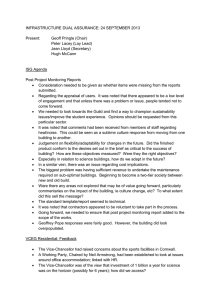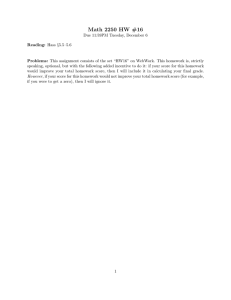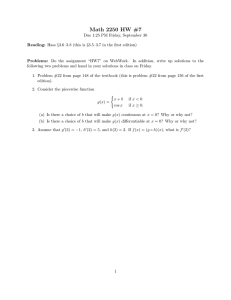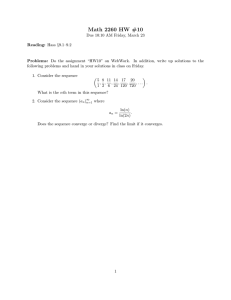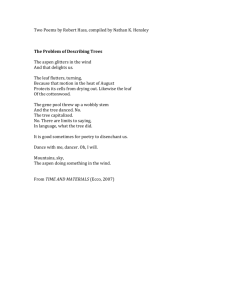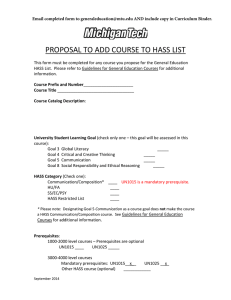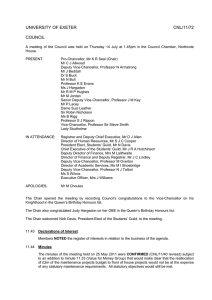UNIVERSITY OF EXETER CNL/11/40 COUNCIL
advertisement
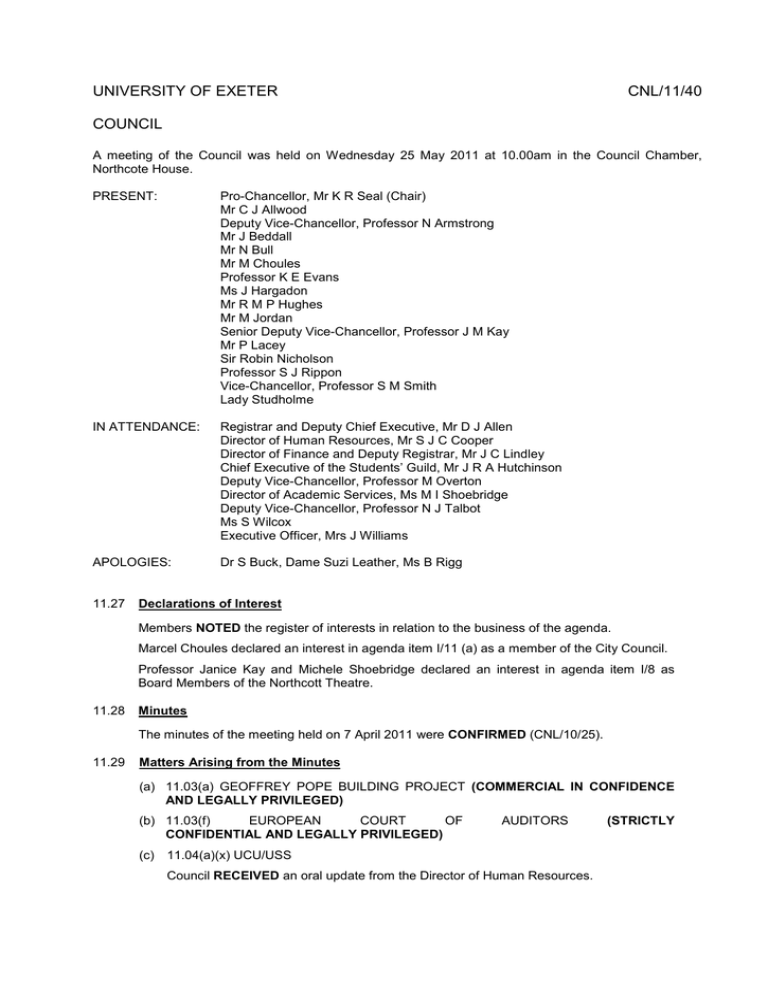
UNIVERSITY OF EXETER CNL/11/40 COUNCIL A meeting of the Council was held on Wednesday 25 May 2011 at 10.00am in the Council Chamber, Northcote House. PRESENT: Pro-Chancellor, Mr K R Seal (Chair) Mr C J Allwood Deputy Vice-Chancellor, Professor N Armstrong Mr J Beddall Mr N Bull Mr M Choules Professor K E Evans Ms J Hargadon Mr R M P Hughes Mr M Jordan Senior Deputy Vice-Chancellor, Professor J M Kay Mr P Lacey Sir Robin Nicholson Professor S J Rippon Vice-Chancellor, Professor S M Smith Lady Studholme IN ATTENDANCE: Registrar and Deputy Chief Executive, Mr D J Allen Director of Human Resources, Mr S J C Cooper Director of Finance and Deputy Registrar, Mr J C Lindley Chief Executive of the Students’ Guild, Mr J R A Hutchinson Deputy Vice-Chancellor, Professor M Overton Director of Academic Services, Ms M I Shoebridge Deputy Vice-Chancellor, Professor N J Talbot Ms S Wilcox Executive Officer, Mrs J Williams APOLOGIES: Dr S Buck, Dame Suzi Leather, Ms B Rigg 11.27 Declarations of Interest Members NOTED the register of interests in relation to the business of the agenda. Marcel Choules declared an interest in agenda item I/11 (a) as a member of the City Council. Professor Janice Kay and Michele Shoebridge declared an interest in agenda item I/8 as Board Members of the Northcott Theatre. 11.28 Minutes The minutes of the meeting held on 7 April 2011 were CONFIRMED (CNL/10/25). 11.29 Matters Arising from the Minutes (a) 11.03(a) GEOFFREY POPE BUILDING PROJECT (COMMERCIAL IN CONFIDENCE AND LEGALLY PRIVILEGED) (b) 11.03(f) EUROPEAN COURT OF CONFIDENTIAL AND LEGALLY PRIVILEGED) AUDITORS (c) 11.04(a)(x) UCU/USS Council RECEIVED an oral update from the Director of Human Resources. (STRICTLY 2 of 8 Since the last update to Council the Joint Negotiating Committee had met again and the UCU representatives had been present at this meeting. The Chair, Sir Andrew Cubie, had used his casting vote at this meeting to pass the proposed changes to the scheme. It was understood that the changes would be implemented in the autumn. As a result, it was likely that UCU would hold a further ballot for industrial action and may try to target admissions and external examiners. However, this was an emerging situation and the University would have to wait to see what UCU’s next steps were. 11.30 Vice-Chancellor’s Report (a) Council RECEIVED a report from the Vice-Chancellor (CNL/11/26), which covered the following topics: (i) The launch of the Business School’s One Planet MBA programme in September 2011. (ii) Professor Helen Taylor had become the fourth recipient of the British Association for American Studies Honorary Fellowship, awarded for her outstanding contribution to American Studies over the past four decades. (iii) Dean of the Business School – following the resignation of Professor Richard Lamming, Professor Robin Mason had been delegated all of the responsibilities and powers of the Dean and would act in that capacity until the appointment of a new Dean. The Vice Chancellor recorded his gratitude to Professor Lamming for all that he had contributed over the last two and a half years. (iv) Chief Executive of Tremough Campus Services – Niamh Lamond had been appointed Group CEO of the Tremough Campus Services Group and would take up her new post on 4 July 2011. th (v) League Table Update – Exeter had been ranked 15 in the Independent Good th th University Guide, up from 24 last year and the Guardian had ranked Exeter 11 in its 2012 league table, up three places from last year. (vi) OFFA Access Agreement Submission – the University’s access agreement was submitted to OFFA on 19 April. OFFA expected to announce the outcomes on 11 July. (vii) University Budget Scrutiny Group – the inaugural meeting of the Budget Scrutiny Group had taken place, jointly chaired by the Registrar and the Guild President. (viii) Bribery Act – this Act would come into force on 1 July 2011. Council would be provided with a full briefing at its July meeting exploring the implications for the University. (ix) Times Higher Leadership and Management Awards – the University of Exeter had been shortlisted for four prestigious Times Higher Education Leadership and Management Awards 2011: Outstanding International Strategy, ICT Initiative of the Year, Outstanding Human Resources Team and Outstanding Leadership & Management Team. The winners would be announced at a ceremony in London on 16 June. (x) Government’s White Paper on the Future of Higher Education – this was due to be published in the next few weeks and would be followed by a period of consultation. (b) In addition to the written report, the Vice-Chancellor drew attention to the following: (i) Members of Council had received a letter from Professor Neil Armstrong informing Council of the decision to appoint Professor Robert van de Noort as Dean of Social Sciences and International Studies with effect from 01 August 2011. Council ENDORSED this appointment. (ii) The University’s rise to 11 in the Guardian League Table reflected improvements in all but two of the performance measures, and particularly in entry tariff standards and career prospects. It was worth noting that the Guardian League th 3 of 8 Table was different to those of the Independent, Times and Sunday Times in that it concentrated on teaching performance and excluded research ratings. (iii) The University had won two awards at the Michelmores and Western Morning News Commercial Property Awards. Bob Alcock was named Property Personality of the Year and the INTO Building won Building of the Year. Members recorded their congratulations to Bob. (iv) The Government White Paper (CONFIDENTIAL) 11.31 Financial Forecast 2010/11 Council CONSIDERED the financial forecast 2010/11 (CNL/11/27). A historic cost surplus of £10.8m was now forecast for 2010/11, a further substantial improvement of £3.9m compared to the previous forecast of £6.9m and £6.4m above the original budget of £4.4m. The bonus of £0.8m was now included in the forecast as the £7.0m historic cost operating surplus target was forecast to be achieved. This document represented the final forecast of the year to be reported to Council and all areas of the University had been reviewed. Monitoring would continue and any exceptional items would be reported to VCEG. This, however, was the forecast against which the outturn for 2010/11 would be reported. There was likely however to be an adverse impact following the valuation of the Geoffrey Pope Building which may reduce the historic cost surplus by between £3m and £4m. As in the statutory accounts for 2009/10 this impairment would not be treated as an exceptional item. However, Council APPROVED the recommendation from VCEG that, in line with last year, the impairment figure should be excluded for calculating the University bonus target. In addition Colleges were being asked to consider any additional one-off expenditure that they could get away before the end of July in order to reduce pressure in future years. This would also have no impact on the bonus target. The University was forecasting to meet all bank covenants and financial parameters at the year-end. University cash balances for the year were forecast at £15.4m. This was very close to the cash headroom minimum parameter of £15m. Cash flow would be monitored carefully and it may be considered appropriate to make a further draw down of loan funding before year end. Capital grant, primarily in respect of Cornwall projects, had reduced in year by £5m in line with the reduced in year spend. These were all timing differences and did not impact on the overall capital programme and associated spending. Total expenditure relating to the RKT Strategy was now forecast at £1.6m. This was a reduction of £0.2m compared to the previous forecast, due to the timing of senior appointments and appointments bringing funding with them. It was possible that not all the planned expenditure on start up costs associated with academic appointments would be expended prior to year end. There may therefore be further favourable variances in the final outturn. Richard Hughes commended the forecast and congratulated the finance team on an excellent report which now included staff number data and would be further developed in future years. 11.32 Draft Budget 2011/12 Council CONSIDERED the 2011/12 draft budget (CNL/11/28). The Chair noted that Council had never received a draft budget at this stage in the year previously. This was due to the investment in the Business Intelligence project which was an outstanding project. This now gave Council a first bite of the cherry with the budget and this was very important for the move to 2012. The Director of Finance and Deputy Registrar noted the following key points from the draft budget: • This was still a draft budget and would not be final until it was brought to Council in July. 4 of 8 • The draft consolidated historic cost budget for 2011/12 was a £1.6m operating surplus, compared to the £1.2m surplus submitted to HEFCE. There were no exceptional items budgeted and therefore the overall draft position was a budget surplus of £1.6m. This represented 0.6% of total University income, well below the target of 5% set out in the Finance Strategy. This was however the lowest point of the “valley of death” prior to increasing surpluses forecast for 2012/13 onwards. • The draft College budgets were delivering above the target set overall; there were however some individual variances within that financial envelope and VCEG had requested that some Colleges produce a revised budget that adhered to the targets set. • Professional Services were within the target budget with 1% efficiency savings and 2% vacancy savings included. • The budget incorporated the impact of a total of £1.5m Value for Money initiatives which had been implemented as a means of creating headroom for recurrent investment in areas impacting on the student experience and in preparation for the new fees environment. In addition £2m had been diverted from long-term maintenance projects planned in 2011/12 to non-recurrent investment in the ‘look and feel’ of the campus. • The draft budgets of PCMD and TCS were included but there was more work to be done on these before the final budget. • All bank covenants and financial parameters, with the exception of the surplus target percentage, were budgeted to be met. The University did not expect the 5% surplus target to be met until 2013/14. • The draft budget included payroll costs at 55% of turnover, below the fundamental parameter of 57%, but at the warning level of 55% set in the revised Finance Strategy. This reflected the substantial investment in additional academic staff at a time when the University turnover was yet to reflect the impact of increased tuition fees. More work would be done on staff recruitment and SSRs for the final budget. • A contingency of £3.6m was included in the draft budget. This was a £3m central contingency, as in 2010/11, and £0.6m to mitigate against the risk from the RKT strategy for capital equipment associated with academic appointments. A 20% buffer was also included for a potential spike in utility costs. • The draft figures did not currently include any University bonus. This had contributed to the available investment from value for money initiatives. Council was recommended to set a target for 2011/12 for the University bonus of a historic cost surplus of £5.0m. The draft budgeted position would therefore need to be improved by £4.2m to a total of £5.8m to allow payment of a bonus of £0.8m. Richard Hughes welcomed the draft budget and congratulated colleagues on the implementation of the new systems that had allowed a draft budget to be shared with Council in May. It was noted that it would be important to look at the risks for 2011/12 very carefully and there were additional risks from pay awards and PCMD funding. There were also substantial cuts in HEFCE capital funding during 2011/12 and this would have a greater impact on cash inflow than was shown on the income line. The University faced a huge recruitment challenge during 2011/12. Appendix 5 indicated that there were 125 new and 46 existing posts to be appointed and this would stretch resources. Colleagues needed to be aware of this challenge whilst recognising that it was key to meeting SSR targets. Members recorded their thanks to Jeremy and the finance team and agreed that the report was a very good way in to the Budget. Council APPROVED: (a) A minimum historic surplus position for the final budget of £1.2m. (b) College targets as set out in Table 3. 5 of 8 (c) The surplus target of £5m for release of the University bonus. However, as the year progressed, the bonus target would not be penalised should VCEG wish to undertake further strategic investment for 2012/13. Further work would continue over the next few weeks and the final budget proposal for 2011/12 would be presented to Council on 14 July for approval. 11.33 Value for Money Group Council CONSIDERED a paper from the Value for Money Group (CNL/11/29). The report made clear that it only focused on those activities that were actively being managed by the Value for Money (VfM) Group. They did not exclusively represent all the VfM activity that the University was engaging in. The report set out short and long term savings activities and had been considered by Audit Committee. VCEG RECOMMENDED THE REPORT TO COUNCIL. The programme had progressed since the Council away day discussion and the initiatives were now contained in the draft budget. A number of initiatives were now underway in terms of long term savings. This included: • • • • • • The development of a Business Case to implement a special purpose vehicle (SPV) that would allow the University to increase earned income and grow commercial activities. The introduction of Lean Process redesign techniques. A lot of work had been done to investigate and produce a lean strategy for the University. However the timing of the launch of this initiative had been put back due to concerns regarding workload within Services and Colleges. The Staff Suggestion Scheme was launched in March 2011 and the first tranche of ideas had been received and were being reviewed. The University had started preliminary discussions around outsourcing. Whilst there may be savings to be made in some areas, until the issue of VAT was resolved these were unlikely to be realised. Therefore there would be no further exploration of areas except for IT currently. The University had undertaken preliminary discussions with another University to explore possible options for Shared Services. An external consultant had been engaged to review the opportunities and provide recommendations. Council would be kept informed of progress on this. Initial work was undertaken in January 2011 to identify invest to save opportunities which would pay back the initial investment within 2 years. Few ideas were identified and all required further work to ascertain the feasibility. The initiative was now considering medium term invest to save initiatives and the payback period would be increased to four years. In discussion with members the following key points were noted: • • • • • The programme activities were commended but the University should caution against initiative overload for colleagues. The recommendations noted in the paper had been dealt with by VCEG. The University currently allocated around £4m per annum to maintenance projects. Many of these were unseen to staff and students e.g. replacing iron pipes for gas. Therefore given the strategic priority for 2012 £2m of this budget would be reallocated to ‘front of house’ activities to update these areas quicker than would normally happen. This would enhance the look and feel of the campus for students and parents ahead of 2012. Whilst there would still be a VAT issue on shared services, there would be an opportunity for significant join investment e.g. for high performance computing, which the University could not afford to do on its own. The University was confident that the £1.5m savings for 2011/12 would be achieved. Key risks were slippage / delay to procurement and invest to save initiatives. Some savings also related to the University bonus. Members were very supportive of the implementation and delivery of the VfM initiatives. 6 of 8 11.34 Humanities and Social Sciences (HASS) Strategy: Task and Finish Group st (1 bite of cherry) Council CONSIDERED a report from the HASS Strategy Task and Finish Group on the HASS Strategy (CNL/11/30). This paper reported on progress to develop a HASS Strategy for the University. It described the process that had been undertaken to date and next steps proposed. The intention remained to complete this work by the end of the session. This was a tight but achievable schedule. Professor Nick Talbot underlined the strategic importance of the review. The University had world class academics and capacity in HASS but the arena for research funding was changing. Research funding would be focused on large cross discipline themes and whilst scientists had intuitively worked in this way for a number of years it was a more dramatic change for HASS. It was clear that the Treasury and the Department for Business Innovation and Skills wished to see research focused in to much bigger awards and Exeter needed to be prepared institutionally for this change. The external peer review would be critical to the process for the HASS Strategy, as it had been for the Science Strategy, and would be completed before the final document was brought to Council in July. The HASS Strategy Task and Finish Group had first convened in September and since then had considered the strengths of the HASS research environment at Exeter and matched that to obvious sources of strategic growth and opportunity in the research councils and other main funding bodies. The Group initially considered around 20 separate themes but had now reduced these to 6, one of which, Environment and Sustainability, could be linked to the science strategy theme of Climate Change and Sustainable Futures. The themes were put to a process of internal consultation and the feedback from this was looked at in detail. The 6 themes encompassed 425 HASS academic staff with a very good spread across expertise by these themes. About 60% (£14.6m) of HASS income over 3 years came from across these themes. The Group had looked at the age and career profiles of academics coming through these themes and believed that each theme had real sustainability and durability. They would provide a vehicle for bringing on new researchers. The group also believed the themes were international in scope and would support links with key international partners. It was hoped that during the next phase of the process consideration would be given to identifying stronger theme titles which would capture the imagination of funders and new academic hires. The timeline for the sign off of the Strategy was important to ensure the University was positioned well to take advantage of the changes in the Research Councils and other funders which were happening very quickly. The process would be compressed but it was important that it stayed on track. Marc Jordan, lay member of the HASS Strategy Task & Finish Group, commended the paper to Council and noted that intellectual rigour along with imagination and business sense had been applied to the process. The external peer review would be eagerly awaited along with the modifications that would result from this. Sir Robin Nicholson, Dual Assurance Lay Lead for Research, particularly commended the process and the spirit in which it had been entered in to by colleagues in HASS. People recognised the benefits of forming these themes and it was presentational to the outside world; for impact and funders. In discussion with members the following points were noted: • • There would be scope for considering modest central investment if the HASS Strategy could convince VCEG that the strategy would bring in income and reputation over and above what the Colleges would have done from their business plans. The timeline for investment would potentially flow later than 2011/12. The Terms of Reference appeared quite clunky and the development of interdisciplinary areas needed to be brought out as a strong USP. 7 of 8 • • The external reviewers’ thoughts on whether the more general themes or more focused themes worked better would be welcomed. It was noted that there would always be a tension between these. A much more specific reference would be made in the final document to early career research stars and how the University created an environment for them and supported them to be interdisciplinary. Council recorded their thanks to the Task and Finish Group, NOTED the progress to date, and ENDORSED the timetable which, subject to VCEG advice, would see the work on external review and funding opportunity assessment completed by the end of the session and the final strategy signed off by Council in July. 11.35 Northcott Theatre (STRICTLY CONFIDENTIAL) 11.36 Infrastructure Strategy Fund – Tranche 2 Profile – Revision B Council CONSIDERED the Infrastructure Strategy Fund – Tranche 2 Profile – Revision B. (CNL/11/32). The cash flow profile of the Infrastructure Strategy has been reconsidered; with particular emphasis on student experience and bringing forward spend on the teaching and learning space refurbishment and the IT infrastructure works. To enable this, spend on the Great Hall upgrade and the proposed Business School research project would be pushed back. Whilst Council had approved the total envelope for the Strategy, projects within the Strategy would still come forward to ISG and Council as required for approval. Council APPROVED the cash flow profile (Revision B) and NOTED the funding arrangements to facilitate the delivery of the Physics Building refurbishment project in 2011. 11.37 Capital Procedures Council CONSIDERED the revised Capital Procedures (CNL/11/33). The original Capital Procedures were adopted in 2007 and this had been a huge step forward for the University. The Procedures were updated in September 2008. As it was nearly two and half years since the last revision it was time to bring the procedures up to date with regard to both organisational changes and operating procedure. The paper detailed the changes to be made to the version currently posted to the Finance Service web pages. It was noted that paragraph 2.1.4 indicated the revised authorisation limits. As a result of the new limits ISG would be given more responsibility but the value at which projects came forward to Council would reduce from £3m to £2m. Richard Hughes, Pro Chancellor (Finance) commended the paper to members as an acceptable proposal that struck the right balance. Council AUTHORISED the changes to the Capital Procedures as recommended by ISG. 11.38 Capital Developments (a) 10.88(a) – RESEARCH INNOVATION AND LEARNING DEVELOPMENT (RILD) – NEW BUILD AT RDE WONFORD (COMMERCIAL IN CONFIDENCE) (b) 10.88(b) – RESIDENCES IN CORNWALL (COMMERCIAL IN CONFIDENCE) (c) 10.88(c) – PCMD TRURO RESIDENCES Council RECEIVED an oral update from the Director of Finance and Deputy Registrar. Further due diligence had been carried out on the Business Plan for the residences and as a result it was clear that the operating costs for the residences would be much higher than originally presented. This significantly changed the financial benefits of the plan. The Dean of PCMD had therefore decided to call a pause to the development so that he 8 of 8 could consider whether this investment would still achieve the strategic goals he had hoped for or whether PCMD funds would be better invested in other strategic projects. 11.39 Council Nominations Committee Council CONSIDERED a report from the Council Nominations Committee (CNL/11/37). Council APPROVED: (a) A full and thorough review of the Council skills matrix; in light of the changes to higher education and the new world that the University was entering. (b) Membership of Committees 2011/12. (c) Dual Assurance and Dual Engagement Portfolios 2011/12. (d) Membership of Trusts 2011/12. 11.40 Staff Liaison Committee Council RECEIVED the minutes from the meeting of the Staff Liaison Committee held on 28 April 2011 (CNL/11/38). 11.41 Affixing the Seal of the University Council AUTHORISED the fixing of the University seal to the documents listed in CNL/11/39. 11.42 Chair’s Closing Remarks At its meeting in July Council would be visiting the Students’ Guild. Other items for the July agenda would include a briefing on the new Bribery Act, a Review of the Academic Year, a paper on the Cornwall Review, and the University Budget for final approval. JLW/JAL 16 June 2011 M:\Exec Officer\COUNCIL\2010-11\May 2011\Council Minutes 25 May 2011 Jean's version.doc
